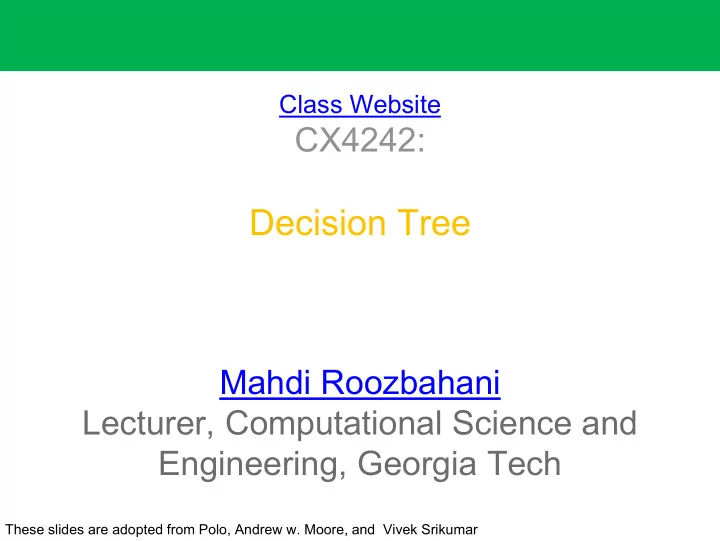

Class Website CX4242: Decision Tree Mahdi Roozbahani Lecturer, Computational Science and Engineering, Georgia Tech These slides are adopted from Polo, Andrew w. Moore, and Vivek Srikumar
𝑌 2 𝑌 1
Visual Introduction to Decision Tree Building a tree to distinguish homes in New York from homes in San Francisco 3
Decision Tree: Example (2) Will I play tennis today? 4
Decision trees (DT) Outlook? The classifier: f T (x) : majority class in the leaf in the tree T containing x Model parameters: The tree structure and size 5
Decision trees Pieces: 1. Find the best attribute to split on 2. Find the best split on the chosen attribute 3. Decide on when to stop splitting 6
Categorical or Discrete attributes Label
Attribute
Continuous attributes
Test data
Information Content Coin flip Entropy ~ Uncertainty Which coin will give us the purest information? Lower uncertainty, higher information gain
different
What will happen if a tree is too large? Overfitting High variance Instability in predicting test data
How to avoid overfitting? • Acquire more training data • Remove irrelevant attributes (manual process – not always possible) • Grow full tree, then post-prune • Ensemble learning
Reduced-Error Pruning Split data into training and validation sets Grow tree based on training set Do until further pruning is harmful: 1. Evaluate impact on validation set of pruning each possible node (plus those below it) 2. Greedily remove the node that most improves validation set accuracy
How to decide to remove it a node using pruning • Pruning of the decision tree is done by replacing a whole subtree by a leaf node. • The replacement takes place if a decision rule establishes that the expected error rate in the subtree is greater than in the single leaf.
Recommend
More recommend